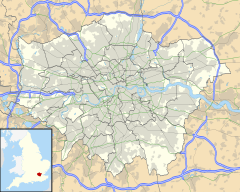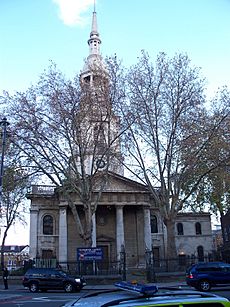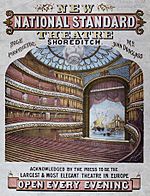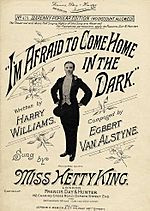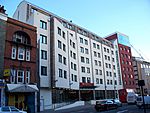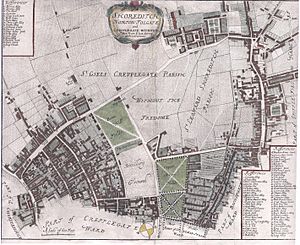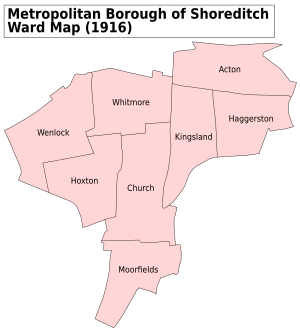Shoreditch facts for kids
Quick facts for kids Shoreditch |
|
|---|---|
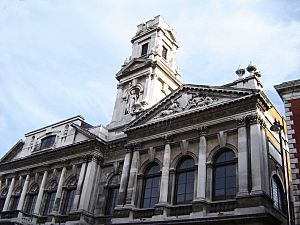 Shoreditch Town Hall |
|
| OS grid reference | TQ325825 |
| • Charing Cross | 2.5 mi (4.0 km) WSW |
| London borough | |
| Ceremonial county | Greater London |
| Region | |
| Country | England |
| Sovereign state | United Kingdom |
| Post town | LONDON |
| Postcode district | EC1, EC2 |
| Postcode district | E1, E2, N1 |
| Dialling code | 020 |
| Police | Metropolitan |
| Fire | London |
| Ambulance | London |
| EU Parliament | London |
| UK Parliament |
|
| London Assembly |
|
Shoreditch is an area in London, England. It is located in the London Borough of Hackney and also includes parts of Tower Hamlets. Shoreditch is just north-east of the City of London and is part of London's East End.
In the 1500s, Shoreditch was a very important place for Elizabethan Theatre. It has been a fun entertainment spot ever since. Today, you can find many pubs, bars, and nightclubs there. The busiest areas are closer to the City of London, while other parts are mostly homes.
Contents
What's in a Name?
The name Shoreditch has been spelled in different ways over time, like Soredich (around 1148) and Schoresdich (1220–21). Most experts agree the name comes from an old English phrase, "scoradīc", which means "shore-ditch". The "shore" could mean a riverbank or a steep slope.
Some people think the "ditch" might have led to the River Thames. However, the City of London is between Shoreditch and the Thames, so this idea is debated. Another idea is that the name came from "Sewers Ditche", meaning a drain or waterway. Shoreditch used to be a very wet, boggy area. A river called the Walbrook once flowed through here, and it was known as the Deepditch or The Ditch.
There's also a popular story that says Shoreditch was named "Shore's Ditch" after Jane Shore. She was a famous woman who lived during the time of King Edward IV. The story says she died or was buried in a ditch in the area. You can see this legend remembered in a painting at Haggerston Branch Library and on tiles in a shop on Shoreditch High Street. But this story isn't true, because the area was called Shoreditch long before Jane Shore was born! Records from the 1100s and 1200s already use versions of the name.
Another old idea, which is also not believed today, was that the name came from Sir John de Soerdich. He was a local lord during the time of King Edward III (1327–1377).
History of Shoreditch
Early Days
Even though Shoreditch is now part of Inner London, it used to be a town just outside the City of London. Its center was Shoreditch Church. This church is at a crossroads where Shoreditch High Street and Kingsland Road meet Old Street and Hackney Road.
Shoreditch High Street and Kingsland Road were once part of an old Roman road called Ermine Street. This road, also known as the Old North Road, was a main route for coaches heading north from London. The road made by Old Street and Hackney Road was probably also a Roman road. It connected places like Silchester and Colchester, going around the south of the City of London.
Shoreditch Church is very old. It's even mentioned in the famous nursery rhyme "Oranges and Lemons" with the line "when I grow rich say the bells of Shoreditch."
From the 1100s until 1539, there was a priory (a type of monastery) in Shoreditch called Holywell Priory. It was located between Shoreditch High Street and Curtain Road. Today, nothing is left of it.
The Time of Shakespeare
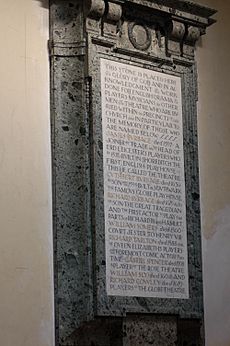
In 1576, a man named James Burbage built the very first public playhouse in England. It was called "The Theatre" and was built on the site of the old Holywell Priory. You can find a plaque on Curtain Road today that remembers this. Some of Shakespeare's plays were performed here!
The next year, the Curtain Theatre was built nearby. Shakespeare's famous play Romeo and Juliet was performed there, and Henry V was also performed in its "wooden O" (meaning its round shape). In 1599, Shakespeare's acting company actually took apart "The Theatre" and moved its wood to Southwark to build the famous Globe. The Curtain Theatre kept showing plays in Shoreditch until at least 1627.
Shoreditch was a good place for these early theatres because it was outside the strict rules of the City of London. The city leaders were quite serious and didn't always approve of plays. Even so, the theatres and other lively places in Shoreditch, like inns and bowling alleys, sometimes caused complaints from people who thought they were too wild.
During the 1600s, rich traders and Huguenot silk weavers moved to Shoreditch. They started a big textile (fabric) industry, especially around Spitalfields. By the 1800s, Shoreditch was also known for making furniture. You can learn more about this at the Geffrye Museum on Kingsland Road. However, as the textile and furniture industries declined, Shoreditch also became a poorer area. Many homes were destroyed during World War II in the Blitz, and new buildings after the war didn't always help the area.
Fun Victorian Times
In the 1800s and early 1900s, Shoreditch was a major center for entertainment, almost as famous as the West End. It had many theatres and music halls:
- The National Standard Theatre (1837–1940) was one of London's biggest theatres in the late 1800s. Famous actors like Henry Irving performed there, even in Shakespeare plays. It was later turned into a cinema and then torn down in 1940.
- The Shoreditch Empire, also called The London Music Hall (1856–1935), was rebuilt in 1894. The famous Charlie Chaplin performed here when he was just starting his career.
- The Royal Cambridge Music Hall (1864–1936) was destroyed by fire in 1896 but rebuilt a year later. It was designed to be very modern, with electric lights and hot water heating.
None of these old entertainment places are still standing today.
Shoreditch Today
Where is Shoreditch?
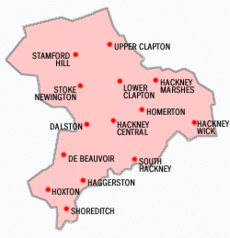
The historic center of Shoreditch is around Shoreditch High Street and Shoreditch Church. In the past, the area of Shoreditch was clearly defined by its parish (a church district) and later by the borders of the Metropolitan Borough of Shoreditch. Since 1965, when that local government unit was closed, the exact borders of Shoreditch are a bit less clear. Hoxton, which is north of Old Street, was historically part of Shoreditch and is often still thought of as part of it.
How Shoreditch is Governed
For many centuries, Shoreditch was an administrative area with its own boundaries. It was based on the Ancient Parish of Shoreditch (St Leonard's) in the county of Middlesex.
Over time, Shoreditch became a "District of the Metropolis" in 1855, and then a Metropolitan Borough in 1899. This borough included modern Shoreditch, Hoxton, and Haggerston. These areas were managed from Shoreditch Town Hall, which you can still see on Old Street today. It has been restored and is now run by a trust.
In 1965, Shoreditch joined with Hackney and Stoke Newington to form the new London Borough of Hackney.
Shoreditch is also home to Baron Wei of Shoreditch. He lives in the area and is a member of the House of Lords, which is part of the UK Parliament.
The part of Shoreditch in the Hackney borough is represented in the House of Commons (another part of the UK Parliament) by Meg Hillier. She has been the MP for Hackney South and Shoreditch since 2005.
The eastern part of Shoreditch, which is in Tower Hamlets, is represented by Rushanara Ali. She has been the MP for Bethnal Green and Bow since 2010.
Famous People from Shoreditch
Many interesting people have lived in or come from Shoreditch:
- George Adams (born 1947), a former professional footballer.
- John Appold, a pioneer of the centrifugal pump.
- Russell Brand, actor and comedian.
- James Burbage, a Tudor actor who built The Theatre; he is buried in Shoreditch Church.
- Richard Burbage, a famous actor in Shakespeare's own company, known for playing Hamlet and Richard III. He is also buried in the church.
- William James Blacklock, a British landscape artist.
- Joshua Compston, a curator who helped develop the art scene in the area in the early 1990s.
- Luke Evans, a Welsh singer and actor.
- Thomas Fairchild, a gardener who was the first to scientifically create an artificial hybrid plant.
- Noel Fielding, comedian and actor.
- Paul Galvin, an Irish fashion designer and former Gaelic footballer.
- Henry Hate, a celebrity tattoo artist.
- Anissa Helou, a cookbook author and chef.
- Damien Hirst, a famous artist who helped develop the area's art scene in the early 1990s.
- Dave Kaye, a pianist.
- Hetty King, a famous male impersonator from the music hall era.
- Jon Kortajarena, a Spanish model and actor.
- Marie Lloyd Jr., an actress and composer.
- Christopher Marlowe, an Elizabethan playwright who wrote plays for the Shoreditch theatres.
- Hoxton Tom McCourt, important in the mod and punk music scenes.
- Bill Meyer, a printmaker and artist.
- Matt Monro, a singer known as "the British Sinatra."
- Miquita Oliver, a TV presenter.
- James Parkinson, a surgeon and activist who studied what is now called Parkinson's disease.
- Jem Smith, a bare knuckle prize fighter.
- William Sommers, King Henry VIII's jester; buried in Shoreditch church.
- Szabotage, a graffiti artist and designer.
- Richard Tarleton, an Elizabethan comedian. Shakespeare's character Yorick is thought to be a tribute to him. He is buried in Shoreditch church.
- Russell Tovey, an English actor.
- Andrew Weatherall, a DJ, producer, and remixer.
- Nat Wei, Baron Wei, the youngest non-hereditary peer in the House of Lords.
- Barbara Windsor, a comedian and actress.
Education
Getting Around Shoreditch
Trains
Shoreditch High Street station is close to Boxpark. You can catch London Overground (![]() ) trains here. It's in London fare zone 1. Trains go north-west to Dalston and Highbury & Islington. To the south, trains go to places like Canada Water, Clapham Junction, West Croydon, and Crystal Palace. Hoxton station is also nearby, on the same line.
) trains here. It's in London fare zone 1. Trains go north-west to Dalston and Highbury & Islington. To the south, trains go to places like Canada Water, Clapham Junction, West Croydon, and Crystal Palace. Hoxton station is also nearby, on the same line.
There's another Overground station at Bethnal Green. From there, you can get trains towards Hackney Downs and Chingford.
You can also find Liverpool Street (![]()
![]()
![]()
![]() ) and Old Street (
) and Old Street (![]() ) tube stations nearby. Both of these stations also have National Rail train services.
) tube stations nearby. Both of these stations also have National Rail train services.
Before 2006, there was a Shoreditch tube station on the London Underground East London line. It closed to make way for the London Overground.
Buses
London Buses provides all the local bus services in Shoreditch. You can find routes like 8, 135, 205, and others on Great Eastern Street and Bishopsgate. Routes like 26, 35, and 47 run on Shoreditch High Street. On Old Street, you can catch routes like 55, 149, and 242.
Cycling
Two special Transport for London (TfL) Cycleways go through Shoreditch.
Cycle Superhighway 1 runs north-south along the west side of the area. It connects Shoreditch to Moorgate in the south and to Dalston and Seven Sisters in the north.
Quietway 13 goes east-west through Shoreditch, mostly on quieter streets. It links Finsbury in the City to the Regent's Canal near Cambridge Heath.
The Regent's Canal towpath is on the very northern edge of Shoreditch, near Shoreditch Park. This path is for both walkers and cyclists. You can follow it all the way from Angel to Limehouse. Going east, the path connects to Victoria Park and Mile End.
You can also find London Cycle Hire Scheme bikes available to rent in Shoreditch.
|
See also
 In Spanish: Shoreditch para niños
In Spanish: Shoreditch para niños
 | James B. Knighten |
 | Azellia White |
 | Willa Brown |


